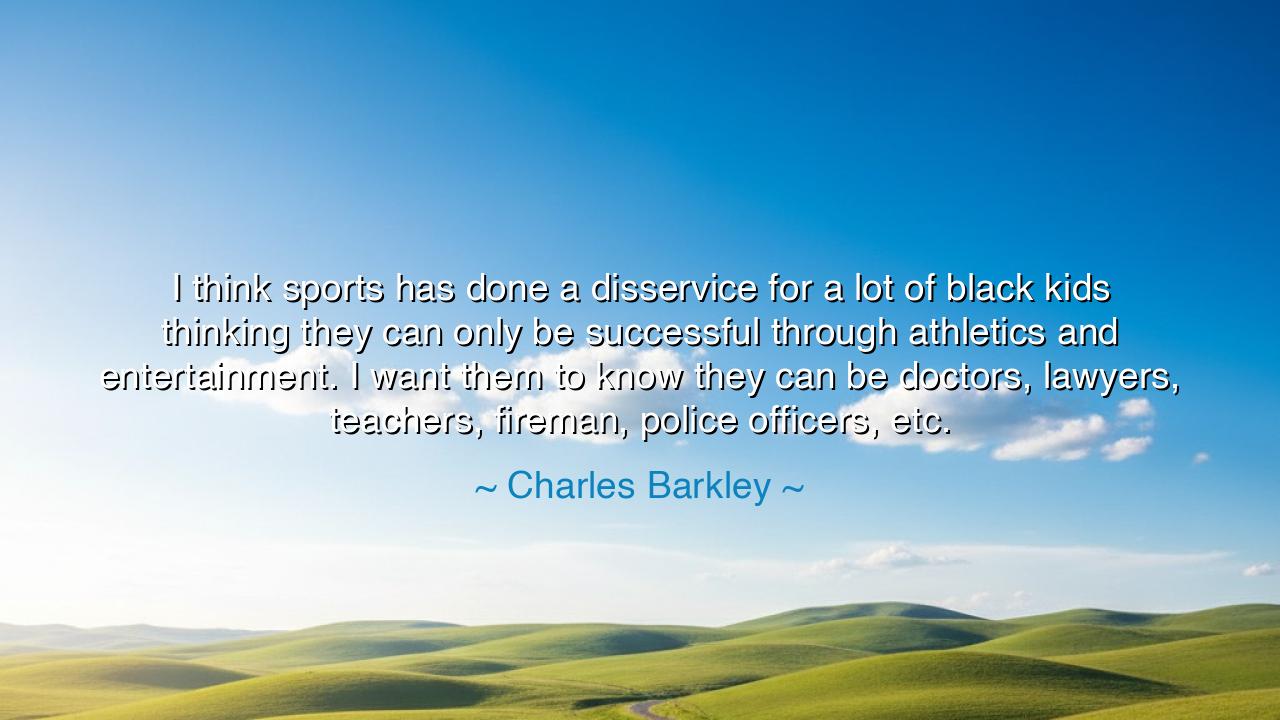
I think sports has done a disservice for a lot of black kids
I think sports has done a disservice for a lot of black kids thinking they can only be successful through athletics and entertainment. I want them to know they can be doctors, lawyers, teachers, fireman, police officers, etc.






Hear the words of Charles Barkley, spoken with the weight of one who has walked the path of glory and yet sees the snares that lie hidden beneath: “I think sports has done a disservice for a lot of black kids, thinking they can only be successful through athletics and entertainment. I want them to know they can be doctors, lawyers, teachers, firemen, police officers, etc.” These words are not the boast of a champion, but the plea of a man who has seen the limits of a narrow dream and calls the young to seek a broader destiny.
When Barkley speaks of disservice, he points to the illusion that confines the imagination of youth. In a world where the triumphs of black men and women are most visible on the courts and on the stage, too many children are led to believe that their future lies only in the chase of the ball or the glare of the spotlight. It is not that athletics and entertainment are unworthy, but that they are but two rivers among thousands, and to tell the young that these alone lead to the sea is to chain their potential.
He desires instead that black children see themselves in every noble calling: doctors who heal, lawyers who defend justice, teachers who kindle the flame of knowledge, firemen who risk their lives to save others, police officers who uphold peace with integrity. For true empowerment comes not from a single field but from the freedom to choose any field, to write one’s destiny not upon the narrow chalk lines of a basketball court alone, but upon the vast canvas of life.
Consider the story of George Washington Carver, born into slavery, who became one of America’s greatest scientists. His genius with agriculture transformed farming and fed the poor, yet he did not find fame in sport or entertainment. His achievements proved that greatness lay also in the mind and in service to humanity. Like Barkley’s vision, Carver’s life teaches that the possibilities for black youth—and indeed for all youth—stretch far beyond what the world’s narrow gaze often permits.
Barkley’s words also carry a hidden warning: the danger of false idols. For when a society holds up only athletes and entertainers as examples of black success, it risks teaching children that their worth lies only in performance, in applause, in fleeting spectacle. But real strength, he reminds us, lies also in the quiet endurance of study, in the patient building of careers, in the service of communities, in the unheralded but essential labor of those who keep the world turning.
The deeper meaning is this: true liberation is not merely breaking barriers in sport or art, but ensuring that every path is open, that every child can see themselves in any role their spirit desires. The struggle for justice is not only to place black men on the stage or on the team, but to place them also in the hospital, in the courthouse, in the school, in the firehouse—anywhere their gifts may flourish.
The lesson for us is clear. If we would honor Barkley’s words, we must expand the vision we give to our children. Show them not only the athletes, but also the surgeons, the inventors, the scholars, the builders. Speak of heroes not only who win championships, but who cure disease, who defend the weak, who teach the forgotten, who guard the streets with honor.
The practical action is this: encourage the young to cultivate many dreams, not just one. Support their studies with the same passion with which we cheer their games. Celebrate their intellectual and civic achievements as much as their athletic ones. In doing so, we plant the seeds of a generation that will not be bound by narrow visions, but will rise to every height of human endeavor.
Thus, Barkley’s words are not only for the black child, but for all humanity. For every people, every community, must remember this: no destiny is confined. The ball may bounce, the song may play, but beyond them lie a thousand other triumphs waiting to be claimed. And only when every child knows this truth will their world truly be free.






AAdministratorAdministrator
Welcome, honored guests. Please leave a comment, we will respond soon